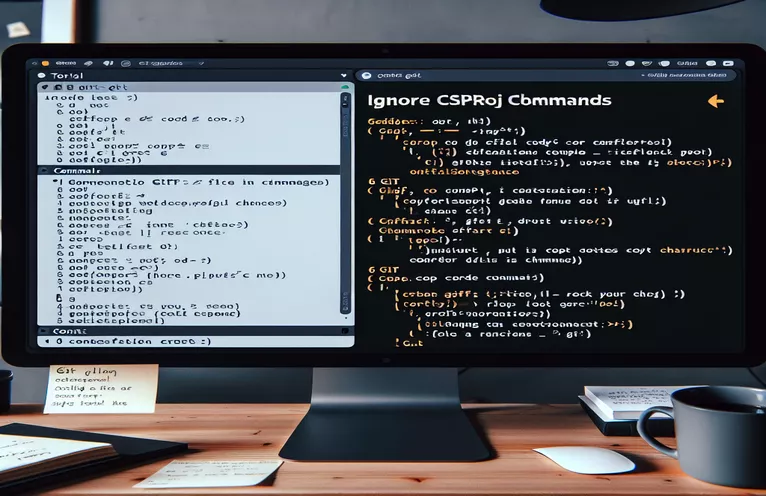Understanding Git File Tracking Exceptions
It is usual to come into scenarios while dealing with Git repositories where some files, while essential for a project, need not be tracked for personal alterations. This is especially important for.NET projects since files like.csproj are crucial to the project's structure but may include local changes that shouldn't be sent to the main repository.
If such files are already being tracked by the repository, adding them to a.gitignore file may not necessarily resolve the issue. Managing local modifications without harming the source becomes challenging as a result. To ensure that local changes stay local, the solution entails changing Git's tracking behavior to ignore future modifications to these files.
| Command | Description |
|---|---|
| git rm --cached *.csproj | Retains the.csproj files in the local working directory but removes them from the index (staging area). |
| echo '*.csproj' >> .gitignore | Makes these files invisible in upcoming contributions by adding the.csproj pattern to the.gitignore file. |
| git update-index --assume-unchanged | Instructs Git to cease monitoring file changes and to accept local modifications without submitting them to the repository. |
| git ls-files --stage | Contains a list of all staged files (those in the index) with the stage number and mode; this list is usually used for scripting. |
| git commit -m "message" | Captures a snapshot of the project's staged modifications and commits the index's current contents with a message supplied. |
| git push origin main | Pushes the committed modifications to the remote repository's origin main branch. |
Managing Git with an explanation of command scripts.Files in csproj
The given scripts are intended to handle the tracking of.csproj files within a Git repository; they are specifically meant to handle situations in which these files exist but modifications to them ought not to be tracked. The git rm --cached *.csproj command, which untracks.csproj files and prevents any modifications from being staged for commits, opens the initial script. For developers who wish to keep these files locally and not push changes to the remote repository, this command is essential. To make sure Git ignores these files in subsequent operations, the echo '*.csproj' >> .gitignore command adds the.csproj pattern to the.gitignore file after untracking.
The git update-index --assume-unchanged command is used in the second script to improve the handling of untracked files. When you want to maintain files locally but keep them from being considered for future commits by Git—that is, to basically ignore any changes made to them—this command comes in handy. It ensures that all files specified by the git ls-files --stage command that are filtered for.csproj files are marked as unchanged. This configuration aids in maintaining the required project files without adding unnecessary local or personal changes to the repository.
Retracing and Disregarding.Git Repositories with csproj Files
Git command line usage
git rm --cached *.csprojecho '*.csproj' >> .gitignoregit add .gitignoregit commit -m "Stop tracking and ignore .csproj files"git push origin main
Using Git to Manage Local Changes Without Impacting Source
Advanced Git scripting
git ls-files --stage | grep '\.csproj$'while read -r file; do git update-index --assume-unchanged "$file"; doneecho "Updated .csproj files to be assumed unchanged."
Techniques for Version Control Local Configuration File Management
Working with configuration files like.csproj needs careful planning while working in a version-controlled environment, especially Git. These project configuration files frequently include local environment-specific settings that are exclusive to the user and do not necessarily need to be shared with other development environments. Decoupling local configurations from those required for the project's construction on several machines is therefore advantageous. Using local configuration files to override shared configuration files without letting Git track them is one way to manage this decoupling.
Depending on the circumstances, another method involves using script injections and environment variables to change the.csproj files during the build process. This approach makes sure that any individual changes are handled on the fly without affecting the core project files, resulting in a cleaner project setup that is simpler to maintain in a variety of settings. Both approaches seek to preserve the shared codebase's integrity while providing room for local changes.
Common Queries Regarding Git File Monitoring
- What is the purpose of the git rm --cached command?
- This command preserves the local copy while removing files from the staging area and index. For files that were inadvertently added to the repository, it is helpful.
- How can I disregard files that Git has previously tracked?
- You must first add the tracked files to.gitignore and then use git rm --cached to untrack them.
- What do.gitignore files serve as?
- Git should disregard files that are purposefully left untracked, as specified by.gitignore files. Git does not alter files that are already tracked by it.
- Can I set a tracked file to be ignored by Git?
- Yes, you can instruct Git to disregard changes in tracked files by using the git update-index --assume-unchanged command. This is helpful for changes made locally in configuration.
- Is it possible to make Git track files that are listed in the.gitignore file?
- Yes, you may use the git add --force command to make Git track files even if they are included in.gitignore.
Important Lessons and Top Tips for Git File Management
A well-managed Git file tracking system can greatly improve project workflow and preserve a clean repository history. The techniques described, like utilizing.gitignore and untracking particular file types, provide strong answers to many problems encountered by developers. These techniques help developers keep an ordered codebase and prevent needless commits by making sure their repositories only include pertinent changes. This method maintains the repository relevant and focused, which facilitates collaboration while also making development easier.


